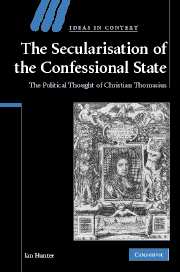Book contents
- Frontmatter
- Contents
- Preface
- Acknowledgements
- Introduction
- Chapter 1 Religion, politics and the university
- Chapter 2 The reform of philosophy
- Chapter 3 Natural law as political psychology
- Chapter 4 Staatskirchenrecht: the religious rights of the prince
- Chapter 5 The toleration of heretics
- Appendix: On the right of Protestant princes regarding heretics
- Index
Chapter 4 - Staatskirchenrecht: the religious rights of the prince
Published online by Cambridge University Press: 22 September 2009
- Frontmatter
- Contents
- Preface
- Acknowledgements
- Introduction
- Chapter 1 Religion, politics and the university
- Chapter 2 The reform of philosophy
- Chapter 3 Natural law as political psychology
- Chapter 4 Staatskirchenrecht: the religious rights of the prince
- Chapter 5 The toleration of heretics
- Appendix: On the right of Protestant princes regarding heretics
- Index
Summary
We have now reached the threshold across which we enter the domain of Thomasius's positive legal and political writings. This threshold, we have argued, is not a continuous transition from the philosophical derivation of norms, duties and rights in the natural law works to their application in the domain of positive law and politics. Neither, though, is it a sharp division or discontinuity between self-enclosed intellectual domains, ‘philosophy’ and ‘law’. This threshold appears, rather, as the awkward passage between two different intellectual genres that were held together not by an underlying philosophy but by the curriculum of a certain kind of university. We have argued that the natural law doctrine elaborated in the Fundamenta juris naturae et gentium was a political psychology designed to form a particular persona or inner comportment for law students – scepticism regarding transcendent norms, receptivity to the notion of law as coercive governance of sociability – but did not determine the form or content of the laws that they would engage with this new outlook. That was the work of a different academic and intellectual genre – university disputations in public law – for which natural law provided the psychagogic preparation but not the technical determination.
Thomasius's most telling blows against the jurisprudence and politics of the Lutheran confessional state – his treatises on adiaphora, toleration, heresy, torture and witchcraft – originated as academic law disputations.
- Type
- Chapter
- Information
- The Secularisation of the Confessional StateThe Political Thought of Christian Thomasius, pp. 113 - 141Publisher: Cambridge University PressPrint publication year: 2007

